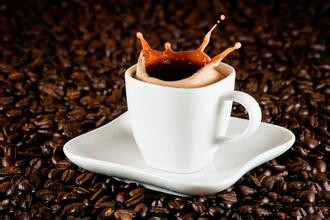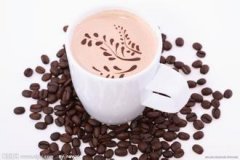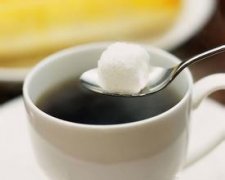Espresso's common sense the four elements of espresso are described in detail.

The Italian summed up four elements for espresso, one of which is indispensable, that is, the so-called four M:
Macinazione: the correct grinding thickness.
Coffee beans are too coarse or too fine to make thick and delicious espresso. The coffee powder is too coarse, the coffee gap in the filter bowl is too big, the resistance to water is not enough, the coffee flow rate is too fast, it is easy to cause excessive extraction, coffee is too bitter.
Whether the coffee powder is correct can be judged by the flow rate. In principle, the extraction time of an ounce of espresso is controlled between 20 and 30 seconds, and the coffee powder thickness should not be too outrageous. At this time, the coffee coming out of the filter bowl is in the shape of flushing or water injection, and an ounce of coffee is extracted in less than 15 seconds, which means that the coffee powder is too thick and is a cup of coffee with insufficient extraction. If the coffee drips from the filter bowl, an ounce takes more than half a minute, indicating that the coffee powder is too fine and easy to be overextracted. The shop assistant should always pay attention to the coffee flow rate and adjust the bean grinder to control the correct flow rate and extraction. In addition, the coffee powder in the bean grinder had better not stay for more than half an hour, so as not to get damp or oxidize and lose all the aroma.
Misdeal: coffee bean comprehensive formula
Italians disdain individual coffee, thinking that the taste of coffee from a single origin is uneven, and it is necessary to integrate coffee from all continents in order to produce espresso with excellent flavor. In addition, in order to improve the consistency of drinks, Italians especially add Roberts beans at lower elevations, which is very different from the practice in northern Europe and the United States that only Arabica beans disdain Robasta.
Macchina: espresso machine
Espresso must be made with an espresso machine. Commercial espresso machines can provide 9 atmospheric pressures to extract the essence of coffee. The espresso machine should be cleaned every day to avoid coffee oil residue and bad taste.
Mano: shop assistant's craftsmanship
The most important of these four M is the shop assistant: Barista, if the shop assistant does not understand coffee and is not professional enough, the best coffee beans, bean grinders and coffee machines are also useless, so the shop assistant must be enterprising and enthusiastic about coffee in order to ensure the quality of each cup of drink.
In Italian towns and towns, there are old espresso shops everywhere, and people who drink them will wonder: "Why are there so many Italian cafes, but the quality is surprisingly good, superior to that of other countries?" These may be relevant, but the biggest secret weapon of Italian cafes is to have a group of well-trained and mission-minded shop assistants (Barista) with a level of expertise unmatched by other countries.
Barista is Italian, that is, bartender in English. Coffee shop clerks in the United States are busy going in and out every day to earn the minimum wage. But Italian shop assistants enjoy high status and preferential treatment. For Italians, conditioning coffee is sacred, and every cup of coffee prepared by a shop assistant is like a good racer driving a Formula one car and a jazz musician playing the trumpet.
For Italian shop assistants, they must have a variety of unique skills, not only the ability to organize all kinds of coffee drinks, but also be kind, good at talking to guests, pay attention to their own clothes and appearance and provide elegant service. By virtue of their professional ability and skills, they have won the respect and reputation of the society, so the turnover rate is surprisingly low. A thousand cafe clerks in Rome, Florence or Naples have been there for decades. you can see a familiar face with sharp hands and feet.
Important Notice :
前街咖啡 FrontStreet Coffee has moved to new addredd:
FrontStreet Coffee Address: 315,Donghua East Road,GuangZhou
Tel:020 38364473
- Prev

Coffee common sense how to brew a cup of "warm" Brazilian coffee
Individual baking: more and more people are fond of roasting their own coffee beans, because usually after the coffee beans are roasted, they can only keep their freshness for 1 to 7 days, and then they will begin to lose their taste, leaving only bitterness and no mellow taste. Therefore, self-baking can ensure the freshness of coffee beans. The traditional roaster is drum-type, and this kind of baking method is stewed.
- Next

Basic steps for heating milk and making milk foam
Pour the cold milk into the half of the jar; insert the coffee maker nozzle into the milk jar near the milk surface. Open the steam valve to make the nozzle spew steam. Adjust the position and angle of the milk tank; when the amount of milk in the milk tank reaches, put the sprinkler into the bottom of the milk tank until the temperature reaches 66C; immediately turn off the steam, remove the milk tank and wipe off the steam sprinkler and spilled foam with a wet towel. Take a closer look at each
Related
- Beginners will see the "Coffee pull flower" guide!
- What is the difference between ice blog purified milk and ordinary milk coffee?
- Why is the Philippines the largest producer of crops in Liberia?
- For coffee extraction, should the fine powder be retained?
- How does extracted espresso fill pressed powder? How much strength does it take to press the powder?
- How to make jasmine cold extract coffee? Is the jasmine + latte good?
- Will this little toy really make the coffee taste better? How does Lily Drip affect coffee extraction?
- Will the action of slapping the filter cup also affect coffee extraction?
- What's the difference between powder-to-water ratio and powder-to-liquid ratio?
- What is the Ethiopian local species? What does it have to do with Heirloom native species?

